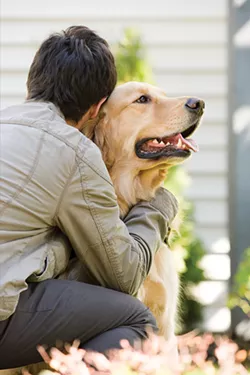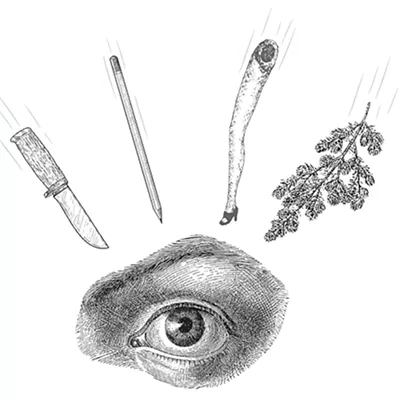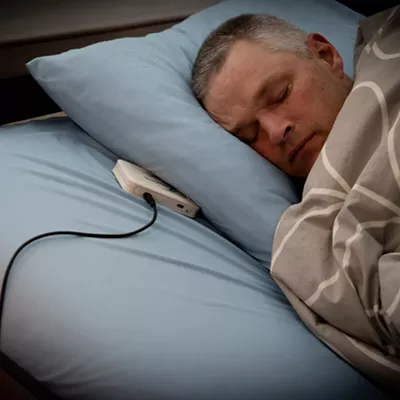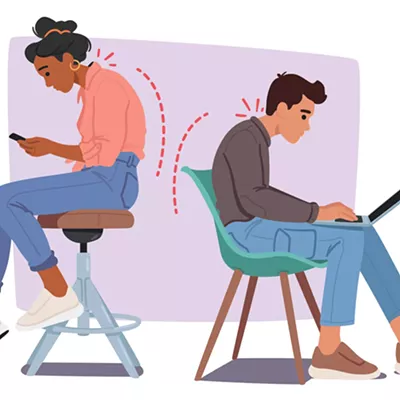A lmost everyone carries with them a certain level of anxiety, whether it's concern for health, stress relating to a job, or worry over personal safety. And that was before 2020. It's an understatement to say that anxiety levels have been increasing due to the pandemic and the many social and political conflicts that have arisen over the past few months.
While it may seem overwhelming, the good news is that we're not alone, and there are things we can do to help ourselves and others work to overcome those feelings of anxiousness.
Anne Browning is a professor and assistant dean of well being for the University of Washington's School of Medicine. She is also one of the founders of the university's Resilience Lab, which aims to support instructors in creating learning environments that promote student mental health and well being.
"The idea of resilience is our ability to recover quickly from difficulties we're facing," Browning says. "At the Resilience Lab we work to give students the tools to navigate challenges and move ahead despite fears or the occasional failure."
This past May, Browning gave a webinar that talked about using resilience techniques to cope with and navigate changes brought about by the coronavirus, a topic she's still actively discussing today.
"It was, and unfortunately still is, a good time to talk about it," she says. "A lot of the anxiety in the air right now is that anticipatory fear, the not-knowing of what's next, and coping with uncertainty is something we all need to be able to do."
While most people view anxiety as a bad thing, Browning says it's important to understand that it's also a useful emotion.
"Anxiety is that voice in the back of your head that keeps you vigilant, aware of your surroundings and able to make decisions to mitigate your risk in any given situation," she says. "During the pandemic that voice might remind us to use sanitizer, stop touching our face mask, stay 6 feet apart, etc."
However, a key part of managing anxiety she says, is recognizing when that healthy vigilance tips toward overestimating the risks in our environment.
"With healthy anxiety, we're able to feel that fear and do what we can to mitigate potential risks," she says. "But people with overwhelming anxiety will overestimate the risk while underestimating what they can do to mitigate it."
"For instance, with the pandemic we've learned that with tools like masks, good hygiene, and distancing we can move about pretty safely," she says. "However, for those with overwhelming anxiety those safety tools aren't enough, and so they stay home."
Because anxiety is so overwhelming, Browning says it's important to keep engaging with those who are struggling.
"We can help anxious friends by getting them to recognize when those overwhelming feelings start, and encouraging them to reevaluate what the risks are and what they can realistically do to mitigate those risks," she says.
If you find it a struggle to quiet anxious thoughts, Browning suggests starting small, by taking a moment to yourself to acknowledge that there are things outside your control.
"You have to make peace with that idea," she says. "Once you've acknowledged that, the next step is to let yourself grieve the loss of plans, things you'd hoped to do, etc. Then lastly, allow yourself to let go of the worry over those things."
For specific situations or scenarios that trigger anxiety, Browning says it can help to focus on your own risk tolerance and what you can do to reduce your anxiety.

"If for example you're struggling with crowded spaces, look at visiting earlier or later, maintaining social distancing, or leaving when it's too much," she says. "Remember that we can only control ourselves, so try not to be frustrated or angry if others appear to have a higher risk tolerance than you."
While social distancing can make it difficult to stay in touch, Browning also encourages maintaining relationships and connections.
"Seek out tools for staying in touch, or meeting up while maintaining distance," she says. "Try not to allow yourself to ruminate on negative thoughts, instead focus on what you're grateful for, or bright spots on the horizon, because recognizing those things gives you time to recover and experience resilience."
TAP INTO STRENGTH
Spokane-based alternative and holistic therapist Mary Willard shares Browning's view of anxiety being linked to lack of control and uncertainty for the future.
"That's why you'll find a lot of anxiety-reducing techniques are about bringing the individuals back to the current moment," she says. "It's about refocusing, and reminding yourself that you're OK right now."
Willard holds an undergraduate degree in counseling and human resources, as well as certifications in emotional freedom techniques (also known as EFT or "tapping"), clinical and medical hypnotherapy. She is also a Simply Being meditation coach, a licensed massage therapist and a reiki master.
"Much of what I do is helping individuals to create internal structures, tools that help them to deal with life circumstances," she says.
Some tips experts often recommend for those struggling with moments of overwhelming anxiety include: taking calming breaths, slowly tensing and relaxing various muscle groups, "anchoring" yourself by focusing on sights or sounds in your immediate surroundings, and cooling off by submerging your face in cold water or holding a cold pack over your eyes.
EASE UP
Activities that can help lessen anxiousness:
- Listening to calming music
- Taking time out to be thankful and focusing on what's good in your life
- Immersing yourself in nature - visit a park, take a walk, lie in the grass or sit under a tree
- Doing something artistic or creative
- Visiting an animal, walking a dog, playing with a kitten
- Calling a friend to share stories or laughter
- Getting your thoughts out in a journal
- Completing an act of kindness for someone
These techniques are suggested because they're known to reduce your heart rate and relax your body, bringing feelings of anxiousness back down to manageable levels.
Willard says an EFT or tapping, while a slightly lesser-known technique, is also highly effective in relieving anxiety and depression.
"Most of my clients after their first session describe feelings of hope, or a burden being lifted," she says. "It's amazing how quickly it's able to shift your emotional learning and bring you comfort and support."
Willard says "tapping" is rooted in the same techniques as acupuncture, a traditional Chinese medicine in which thin needles are inserted into the body at specific points with the intention of balancing physical and emotional energy pathways.
"Tapping is like acupuncture but rather than needles, you use your fingertips," she says. "When we tap we focus on the pain or emotional issue that's front and center for you, and as you go along the blocked energy at the cause of that issue is released, bringing your body back into balance."
She says tapping relieves anxiety by interrupting and eventually erasing the conditioned response we have to fears, allowing us to disengage with the triggers that usually lead to becoming upset.
"Studies have shown tapping is effective because it works with the amygdala, the part of the brain that governs our fight or flight response," she says. "When our fear response is triggered, we're setting up to deal with that threat and our cortisol (stress hormone) levels rise. That's OK initially, but when it's constant it wears on the body. Tapping has been shown to drop cortisol levels, and bring down anxiousness."
While it might seem complicated, Willard says you don't need a professional to try tapping for yourself.
"There are many resources online such as emofree.com, a book called The Tapping Solution, and countless videos and CDs that will walk you through the basics," she says. "It's a pretty forgiving process, in that even if you're not doing it perfectly, it will still help."
If you're planning to try tapping yourself at home, Willard suggests being vigilant in tapping several times a day, even when you're not anxious, so that when those anxious feelings come you're already calmer and centered.
"Keep in mind you may have to tap on an issue several times before it's resolved, as some issues are more complex," she says. "If you're feeling overwhelmed definitely consider consulting with a professional."
HANDLE WITH CARE
If you're looking for techniques other than "tapping" that might help reduce anxiety, Willard suggests tactile artistic hobbies such as finger painting or chalk drawing.
"It doesn't have to be a masterpiece, just as long as it's something you can feel," she says. "That sense of touch brings us into the present moment, helps us recognize what we need to hold onto and what we should let go of because we can't control it."
Willard also suggests getting out into nature, whether it's sitting under a tree in your backyard or walking one of the local trails.
"You don't have to do much, simply observe things like light in the leaves, scents in the air, birdsong, all of these help decrease stress hormone production and lower heart rate," she says. "Animals can also be pleasant and calming companions, so consider walking a dog, or visiting a shelter."
Looking ahead, both Willard and Browning say it will be important for all of us to find ways to combat the fatigue that can set in from battling uncertainty on a daily basis.
"Going forward we need to find ways of refocusing on things we can control, and fostering attitudes of positivity," Willard says.
She says taking time each day to express gratitude — aloud — for good things in your life, and calling friends more often to check in, are a good start.
"When we recognize and express gratitude for the good things in our life we shift our focus from the negative," she says. "Similarly, catching up with friends allows you to feel less isolated, and allows you to empathize and support one another."
Browning agrees, saying she would encourage people to check in on friends, family, and neighbors, and help them find local support if they're struggling. "At the same time, we need to be treating ourselves with compassion and kindness too. Remember this is a moment of global change that will impact all of us, so the focus needs to be on our collective well-being."
TRY THIS
When you're feeling overwhelmed by feelings of anxiousness...
- Stop. Pause. Breathe. Focus on taking deep, calming breaths.
- Ask yourself whether you're hungry, angry, lonely, or tired. Each of these can cause stress and worsen anxiety.
- Use your senses to anchor or bring yourself back into the present moment. For example, ask yourself to find five objects around you that are red.
- Cool off. Try holding a cool pack to your eyes, or submerging your face in cold water. This triggers your diving reflex, which alters body chemistry, dropping your heart rate and helping you relax.
- Slowly tense and then relax your muscles, starting with your neck and shoulders. This will help lower your tension levels.
- Try a basic tapping sequence such as tapping four fingers alongside the karate chop side of your opposite hand.

















